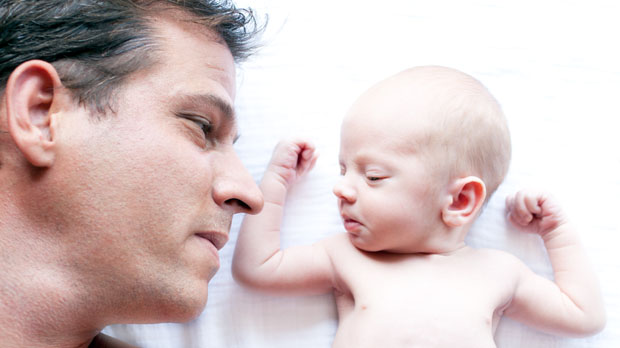Fatherhood ‘makes testosterone levels drop’
Becoming a father makes a man’s testosterone levels drop, say researchers – which could mean human males are biologically wired to help with parenting.
The research, which is published in the September volume of the Proceedings of the National Academy of Sciences of the United States of America (PNAS), is the first large-scale study to provide compelling evidence that human males are “wired” to care for their children.
In species in which males care for young, testosterone is often high during mating periods but then declines to allow fathers to look after resulting offspring.
This study, which was conducted in the Philippines using over 600 subjects, suggests that testosterone levels fall more in men who become fathers than those who do not. This is also seen in other species in which fathers care for their young.
Testosterone boosts behaviour which helps males when competing for a mate. If that is successful and the man becomes a father, activities which relate to mating may conflict with the responsibilities of fatherhood. The body then appears to rein in testosterone production.

Raising human babies ‘co-operative’ work
Anthropologist Christopher Kuzawa, who co-wrote the study, said: “Humans are unusual among mammals in that our offspring are dependent upon older individuals for feeding and protection for more than a decade.
“Raising human offspring is such an effort that it is co-operative by necessity, and our study shows that human fathers are biologically wired to help with the job.”
The researchers, from Northwestern University, found that among men who were single non-fathers at the beginning of the study, men with high testosterone levels were more likely to become partnered fathers by the time of follow-up 4.5 years later.
Further, men who became fathers within a relationship then saw a significant decline in their testosterone levels, which were significantly greater than declines in single men who were not fathers.
Childcare further lowers testosterone
Another of the study’s authors, Lee Gettler, said: “It’s not the case that men with lower testosterone are simply more likely to become fathers.”
“On the contrary, the men who started with high testosterone were more likely to become fathers, but once they did, their testosterone went down substantially. Our findings suggest that this is especially true for fathers who become the most involved with childcare.”
Other studies which showed that fathers tend to have lower testosterone levels were small and were not conclusive about the effect of fatherhood on testosterone levels.
The new study approached the theory by following a large group of men who were not fathers and seeing whether their hormones changed after they became fathers.